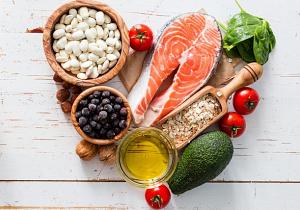8 Endometriosis Diet Tips That May Help You Manage Symptoms, According to Experts
Dealing with endometriosis can be a regular lesson in frustration. There are treatments available, but they don't work well for everyone. And, if that describes you, it's understandable that you'd want to do everything you can to try to make yourself feel better. Enter, an endometriosis-focused diet.
As you probably know, endometriosis is a condition where tissue that forms the lining of the uterus grows outside of it. That can lead to symptoms like intense pelvic pain before and during your period, diarrhea, and pain during sex.
It's important to get this out there upfront: Going on a special diet won't cure endometriosis and isn't even a guarantee to help your symptoms. But experts say you might get some form of relief from altering what you eat. "There is some data that diet may play a role in either exacerbating or controlling symptoms," Amanda N. Kallen, MD, an assistant professor of obstetrics and gynecology at the Yale School of Medicine, tells Health. "But dietary changes alone should not be considered a first-line treatment for true endometriosis."
Still, "the role of diet in endometriosis has gained more attention in recent years," says Jessica Shepherd, MD, an ob/gyn in Texas, tells Health. Several processes that are linked to endometriosis, like inflammation and estrogen activity, can be impacted by your diet, Dr. Shepherd says, leading doctors to think there might be something there.
"Eating a healthy diet can make you feel more comfortable and healthy overall, and there are some studies evaluating whether dietary changes can be a complementary therapy as well," Christine Greves, MD, a board-certified ob/gyn at the Winnie Palmer Hospital for Women and Babies, tells Health.
Though there are no clear recommendations at this point for eating a special diet when you have endometriosis, it's generally thought that some changes might help. Interested in giving it a try? Doctors say these dietary moves are worth considering.
Limit trans fats
Trans fats can naturally occur in animal products or be added to processed foods for taste and texture. But trans fats can raise your bad (LDL) cholesterol levels and lower your good (HDL) cholesterol levels, per the American Heart Association. Eating trans fats also raises your risk of developing heart disease, stroke, and type 2 diabetes.
An older but often-cited study published in the journal Human Reproduction analyzed 12 years of data from the Nurses' Health Study II, looking specifically at diets in women. Researchers found that, among 1,199 cases of endometriosis, women who ate a diet high in trans fats were 48% more likely to be diagnosed with endometriosis than others. "A high intake of trans fats and potentially of animal fats is associated with a higher risk of endometriosis," Dr. Shepherd says.
Trans fats tend to show up in fried, process, and fast foods, and can show up on food labels as "partially hydrogenated oils"—doing your best to avoid them may help.
Avoid gluten
Gluten is a protein found in most grains, and it usually works as a binder in breads and baked goods. There isn't a ton of data on this one, but one older study had 207 endometriosis patients go on a gluten-free diet and found surprising results. After 12 months on the gluten-free diet, 75% of patients had a "statistically significant" change in their pain. As a result, the authors concluded, "painful symptoms of endometriosis decrease after 12 months of gluten free diet."
Research has linked gluten with bodily inflammation—and that may exacerbate endometriosis pain, Dr. Greves says.
Eat a low FODMAP diet
FODMAP stands for fermentable oligosaccharides, disaccharides, monosaccharides and polyols. These are short-chain carbohydrates that your small intestine has trouble absorbing, per Johns Hopkins Medicine. As a result, some people can struggle with digestive symptoms like stomach cramps, diarrhea, and bloating after eating foods high in FODMAPS, like dairy-based milk and yogurt, wheat products, asparagus, onions, apples, and pears.
One smaller study published in The Australian & New Zealand Journal of Obstetrics & Gynaecology, looked at 160 women and found that 72% of those with endometriosis reported a more than 50% improvement in bowel symptoms after four weeks on a low FODMAP diet, compared to 49% of people with irritable bowel syndrome (endometriosis is often misdiagnosed as IBS). "The low FODMAP diet appears effective in women with gut symptoms and endometriosis," the researchers concluded.
FWIW: Low FODMAP foods include things like eggs, meat, some cheeses (brie, cheddar, feta), almond milk, rice, eggplant, cucumbers, grapes, and strawberries.




